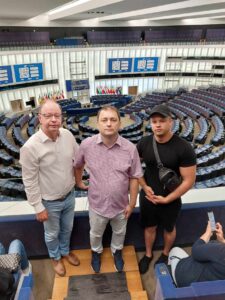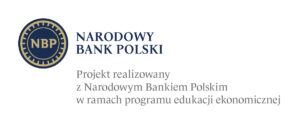Each project has its own Facebook profile. Welcome!
Project: Modern technologies and international projects as the key to the development of the organization
Sector – Adult Education KA122-ADU
Objective of the project – Increase in the competence of the staff enabling the development and expansion of educational and training activities with forms, methods and techniques using modern and innovative technologies and ICT tools.
As the COVID-19 pandemic has shown, access to education is more than ever necessary to ensure a rapid recovery of the economy, and for individual organizations – to return to the path of development after a period of stagnation. In the case of educational institutions, development is ensured by solutions that guarantee participants the comfort of acquiring knowledge, i.e. safety, ease, speed and attractiveness, and at the same time appropriate quality. These conditions are ensured by investments in modern ICT technologies dedicated to education. However, in addition to material investments (hardware, software), investments in human capital, i.e. in the competence of personnel providing services to recipients, are necessary. Comprehensive knowledge of modern technologies and ICT tools for education is needed, as well as the ability to use them properly. High competences and professional skills of employees and trainers are the basis for the quality of specialist services offered in the education sector.
The aim is also to invest in the competences of the staff enabling the organization to enter the path of development. It is about competences that will allow for the diversification of activities and dynamic entry into new areas of the market. The first experience gained by the Foundation in the field of acquiring projects allows us to assume that this market segment is possible for wider exploration, but it requires specialist knowledge, experience and professional skills. The efforts and activities undertaken so far have brought some results, but their effectiveness could be much higher. We see significant potential both on the market side, especially in the international dimension (mainly European – a large supply of programs and project co-financing opportunities offered), and on the part of our organization – substantive preparation of employees and first experience gained. However, there is a need to deepen and systematize knowledge and gain skills and valuable experience.
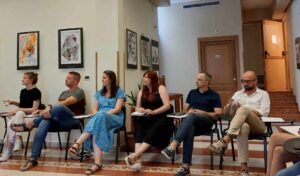 Training Palermo, Sicily 3 – 7/07/2023 “Train the Trainer” course
Training Palermo, Sicily 3 – 7/07/2023 “Train the Trainer” course
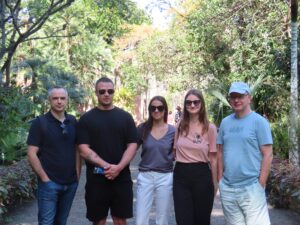 Training in Puerto de la Cruz, Tenerife February 19 – 23, 2024
Training in Puerto de la Cruz, Tenerife February 19 – 23, 2024
Development of sustainable communications of higher education institutions in social media COMSUS
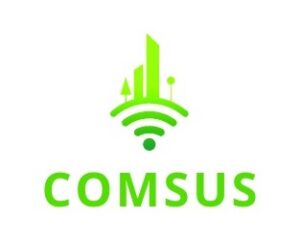
2022-1-PL01-KA220-HED-000090164

Duration from 01/09/2022 – 24 months – till 31/08/2024
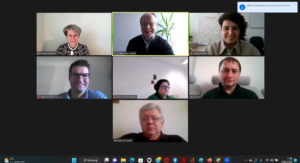
First online COMSUS project meeting
The Zofia Zamenhof Foundation is the leader of the project, and universities from Germany, Turkey and Portugal participate, as well as the Kiev Business School from Ukraina.
COMSUS AIM is strengthening of higher education institutions’ capabilities in promoting the co-creating of resilient, inclusive and sustainable society through sustainable communications with key stakeholders in social media.
Project concentrates on the relationship between media and communication and the environmental, social, and economic dimensions of sustainability. The European Climate Pact (2020), Pact for Skills (2022) are promoting and calling
organisations, educational bodies and public authorities to help people to prepare for work in green conditions and be able to get a jobemployment in the green economy. In response to calls from the EU, the COMSUS project partnership decided to join the implementation of green initiatives through educational tools in higher education sector.
Also COMSUS is oriented on European Skills Agenda (2020). We will help HEIs staff develop more and better Sustainable communication in social media skills and to put them to use for:
- strengthening sustainable competitiveness, as set out in the European Green Deal
- ensuring social fairness, putting into practice the first principle of the European Pillar of Social Rights
- building resilience to react to crises, based on the lessons of COVID-19 pandemic.
Objectives of the COMSUS project:
- to rise HEIs’ teaching, staff academic and scientific staff awareness-raising about environmental and climate-change challenges, develop skills in social media marketing as an instrument of personal brand development, a tool for educational products, promotion of sustainable development values.
- to strength of HEIs capabilities in promoting co-creating of resilient, inclusive and sustainable society through sustainable communications with key stakeholders in social media.
- to support cooperation in higher education for the implementation of sustainable initiatives.
Innovation of the COMSUS project
- COMSUS project has innovative outputs (WP2 E-course “The power of social media in the professional development of teachers: personal brand, tools for educational products, promotion of sustainable development values” for HEIs teaching staff, WP3 E-learning course “Sustainable SMM: sustainable communication in social media for higher education institutions” for HEI communication managers, WP4 Manual for HEIs “Sustainable communication in social media for HEI: how to become a changemaker?”, WP5 Hub of sustainable communications “COMSUS” ), that complement each other,
create added value at EU level, but can function independently; - COMSUS will awareness-raising of HEIs staff about environmental and climate-change challenges and strengthening of higher education institutions capabilities in promoting co-creating of resilient, inclusive and sustainable society through sustainable communications with key stakeholders in social media.
- Project is oriented on European Skills Agenda (2020), the European Green Deal; ensuring social fairness, putting into practice the first principle of the European Pillar of Social Rights: access to education, training and lifelong learning for everybody, everywhere in the EU; building resilience to react to crises, based on the lessons learnt during the COVID-19 pandemic. Metodology of the project takes into account the European Sustainability Competence Framework (GreenComp, 2022, European Commission).
- Given the complexity of communication in this project, we will focus on the direction of communication through social media, the role of which is currently growing rapidly and underestimated by universities and academia.
The COMSUS partnership includes 5 partners. It is a unique combination of HEIs ( HSW MSKU COFAC ), the non-profit sector (FZZ) dealing with sustainable development, inclusion and social media, organization that is comunication bridge between HEIs students and employers in business (KBS).
Discussion of cooperation opportunities, development of intellectual products concepts, needs research to the COMSUS
Partnership started in 2021. KBS – Kyiv Business School from Ukraine offered the idea of COMSUS project and initiated a partnership building in 2021. Partnership was formed in 2022 by Ukrainian partner, when the needs of the target audience of the project were examined and started application writing. Fast experience in NGOs, business, HEIs networking, sustainable initiatives introduction, youth educational projects, focus on social innovations and non formal pedagogical methods, deep understanding of the current state and higher education, that is all made possible for Ukrainian partner to be in the COMSUS project.
The idea of COMSUS project was initiated during the implementation project “SMM4WIN – Social media marketing skills for fostering the inclusion and employability of young people with disabilities”(Project number: 2019-2-PL01-KA205-066133, Erasmus+2019-2021). Representative of KBS prof Huliaieva L, Y..Golovko as professors of Ukrainian HEI ALSRT and FZZ as applicant will in this project together. SMM4WIN Project aims help young people with disabilities get new skills in social media marketing as a tool for professional work, self-realization and communication, promotion of their own personal brand and career development. Among the project participants were universities and students, who confirmed the importance of strengthening the role of social media for universities and the development of HEIs sustainable communication in social media. Accordingly, the KBS come up with an idea to create a new project COMSUS.
How is your proposal suitable for creating synergies between different fields of education, training, youth and sport or how does it have a strong potential impact on one or more of those fields?
European Commission recommends to realise the green and sustainable skills-oriented project with Erasmus+ as a programes providing opportunities to develop forward-looking skills and partnership projects (https://europa.eu/climate[1]pact/about/priority-topics/green-skills_en ). That’s why we chose Erasmus+ to implement the COMSUS project.
Our proposal is based on creating synergies between different fields with a strong potential impact on the higher education sector.
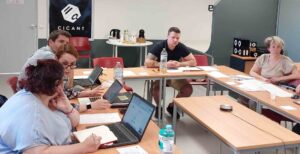 Meeting in Lisbon May 2023
Meeting in Lisbon May 2023
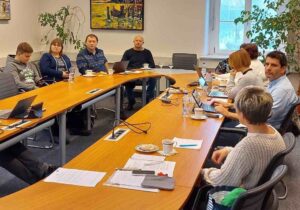 Meeting at the University of Wismar December 2023
Meeting at the University of Wismar December 2023
Important information for Ukrainian partners –
The Zofia Zamenhof Foundation has successfully organized a professional development initiative under the Comsus project, targeting Ukrainian HEI teachers. The program, named ‘The Power of Social Media in the Professional Development of Teachers: Personal Brand, Tools for Educational Products, Promotion of Sustainable Development Values, was conducted in 2023.
“Here is a link to the certificates for participants that finished the e-courses conducted as a part of the COMSUS project:”
https://drive.google.com/drive/folders/1yN1pvWgMDjcOHwAFyddvkxaGjf3HftGS?usp=sharing
Project: Well of Values: Youth as a Social Media Values Promoter
KA220-YOU – Cooperation partnerships in youth.
2022-2-CY02-KA220-YOU-000100271

Deep uncertainty, and unforeseen consequences are characteristics inherent in today’s world. In such a situation, values become a factor that determines one or another choice, which further affects direction of society. Every year humanity confronts “black swans”, in particular the Covid-19 and the global upheavals caused by Russian invasion of Ukraine, which poses threat to the entire world democratic community.There is direct correlation between what values are cultivated in a society and how this society responds to unexpected crises. Moral values inform our social and economic goals and models, managerial actions, political decisions, personal choices and our justifications for them. We can always be held to account for them (https://ec.europa.eu/info/sites/default/files/research_and_innovation/ege/ec_rtd_ege-values-for-the-future.pdf )
It is important to learn to conscious choicemaking in favor of those values that are aimed at building society and a common future. The youth is able to become drivers of change in society and ambassadors of values, it is important to strengthen their civic engagement and youth participation. In digitalization era, most effective tool for creating, promoting and integrating values are social networks, which are main platform for young people to communicate. A considerable majority of EU level NGOs and youth networks considered that their digital / social media presence was quite or very important to sourcing youth representation at a national level (85%). https://op.europa.eu/en/publication-detail/-/publication/57e87ca0-900d-11ea-812f-01aa75ed71a1
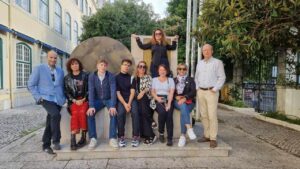 Well of Values Project meeteng – Lizbona, 11, 2023
Well of Values Project meeteng – Lizbona, 11, 2023
It is the opinion of youth leaders, that young people is guided by when making choices based on certain values. Also, agents of influence are youth organizations, which through digitalization can not only convey certain values to a wider number of young people, but also are able to build networking, based on certain values, which promotes sustainability and inclusion. The main tool that helps in work of thought leaders and youth organizations is creativity, as in a constantly changing world, new forms and solutions are needed. It is necessary to develop creativity of youth workers (and their characteristics according to theory of creativity by Torrens, which help to better produce ideas such as Fluency Flexibility, Elaboration,Originality (https://coe.uga.edu/directory/torrance-center ).
Due to the digitalization of youth work, youth are engaged and empowered, active and creative in digital society ,Confident,
resilient and optimistic for the future Accessing new opportunities to network, collaborate and participate in society
(http://surl.li/bpcgk).
The Well&Values project aim is to develop the ability of youth leaders and organizations to use social networks creatively for effective promotion of common values as well as strengthening civic engagement and youth participation.
What are the objectives you would like to achieve and concrete results you would like to produce? How are these objectives linked to the priorities you have selected?
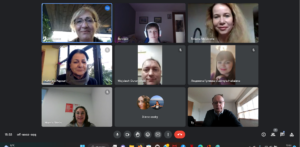
Well of Values online meeting 3 17.02.23
Well&Values objectives:
- to develop young people digital and creative skills enabling them to promote values of the future through social media and
strengthening civic engagement and youth participation (WP2 E-learning course “The value and values of leaders of the future”) - promotion of creativity, involvement, co-creation, development among youth ( WP2 E-learning course “The value and values of leaders of the future”)
- to provide youth organizations digital ability to engage and empower youth (WP3 E-learning course for representatives of youth work organizations “Create&evolve in digital era”)
- to enhance youth leaders to be active and creative in digital society, confident, resilient and optimistic for the future, accessing new opportunities to network, collaborate and participate in society (WP3)
- provide theoretical background, best practices for young leaders and youth workers by development of Manual for young leaders and representatives of youth organizations “Digital creator of values” (WP4 Manual “Digital creator of values” )
- provide the materials/instruments of making creative content in social media based on shared values (WP4, multiplier events).
Organizations from Cyprus, Germany, Portugal and Poland participate in the project.
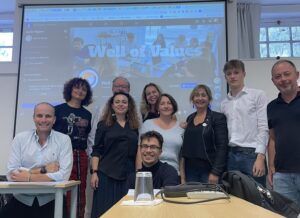 Well of Values project meeting – Lisbon, October 21, 2023
Well of Values project meeting – Lisbon, October 21, 2023
Special Event – Visit to Strasbourg to the EU institutions
During one of the project meetings we had the opportunity to visit the European Parliament. Visit to Strasbourg – EU Institutions – July 31, 2023
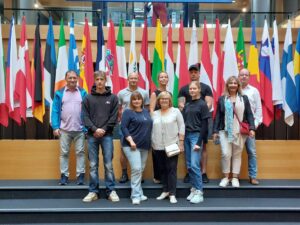
Strasbourg – EU institutions – July 31, 2023
Project: Transformative Digital Learning for General Education Following Covid-19 Impact (CovidEduTDL)
2021-1-LV01-KA220-SCH-000032781-P1

Project duration: November 2021 – November 2023
COVID-19 has promoted the rapid transformation of learning/teaching process. Moving everybody online, putting the transformative digital learning on the base. Nowadays digital learning is a primary tool for teaching and learning. According to the conduced Need Analyses, basing on on-going Fundamental and Applied Research project DocTDLL, Izp-2018/2-0180 in co-operation with Ontario University, Canada, the Readiness Index of the students and educators is lower in comparison with Importance Index for key factors necessary for sufficient transformative digital learning followed by Covid-19 impact. Despite a growing number of countries in Europe and internationally, refocusing the ICT curricula on developing students’ and educators’ digital competence, and introducing the topic in national, regional or school curricula, the digital competence level requires additional evaluation, gaps identification, improvement and practical perspective.
What do we want to achieve by implementing the project?
The objective of CovidEduTDL project is to develop the digital competence training program, including digital competence framework and self-assessment tool adopted to partner-countries, and to create the multimedia handbook on remote teaching-learning finalized to general education teachers/educators. This will help to identify the level of digital competence of general school teachers/educators as well as to improve the digital competence by conducting the training program, using innovative digital educational methods, innovative online resources and tools, promoting networking of institutions, sharing expertise and practices to promote digital education readiness of general school teachers/educators in the context of transformative digital learning.
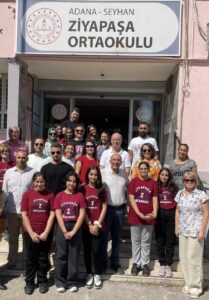 September 25 – 27 Cukrova University in Turkey
September 25 – 27 Cukrova University in Turkey
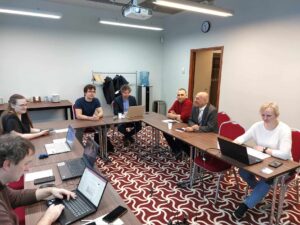 Project meeting entitled Transformative Digital Learning for General Education Following Covid-19 Impact, Jurmala, Latvia January 11-12, 2024 Project leader – REZEKNES TEHNOLOGIJU AKADEMIJA
Project meeting entitled Transformative Digital Learning for General Education Following Covid-19 Impact, Jurmala, Latvia January 11-12, 2024 Project leader – REZEKNES TEHNOLOGIJU AKADEMIJA
SEIDE@CRO Supporting sustainable social entrepreneurship initiatives in digital era: crowdfunding toolbox
2021-1-EL01-KA220-ADU-000033592
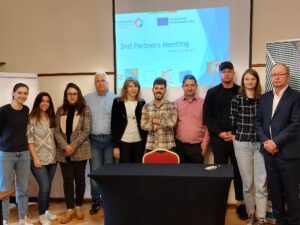
SEIDE CRO Project meeting Warsaw May 15 – 16, 2023
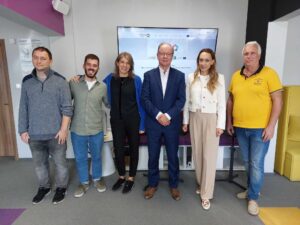 SEIDE CRO Project Meeting Sofia University October 9-10.2023
SEIDE CRO Project Meeting Sofia University October 9-10.2023
Special Event – Sejm of the Republic of Poland
On 14 July 2022, together with the Ukrainian Center of the Future, we organised a scientific conference at the Polish Parliament under the title ‘Ukraine and Poland. The future in new conditions’, which brought together experts from many fields. The event was attended by, among others, Dr. Małgorzata Bonikowska – President of the Centre for International Rela- tions, and Dr. Jarosław Sachajko – Member of the Polish Parliament. The topics of the confe- rence were the current situation of Ukraine and the post-war future and cooperation between our two countries. Our panel allowed for an extremely interesting discussion, during which we touched on ways of cooperation, common opportunities and threats, as well as solutions for the future. Speakers from our Foundation included the President and Vice-President of our Foundation, Zbigniew Dąbrowski, and Dr Wojciech Duranowski, respectively, who brought interesting points of view to the debate.
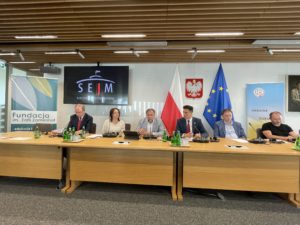
Project: Creative Box: Promoting innovative approaches to creating educational forms in work with youth
2021-1-PL01-KA220-YOU-000028673
Project duration: November 2021 – November 2023
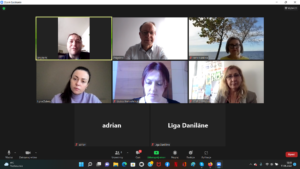
Creative approach in the processes of educating young people is becoming more and more important and desirable skill nowadays. Creativity is not only the engine of economic development or an innovative approach to education in a rapidly changing world, but also a guarantee of socio-cultural change and a way to deal with social challenges, as well as problems caused by the coronavirus pandemic and closure. Modern realities force us to review all pedagogical practices and evaluate them in line with the requirements of digital learning. There is therefore a need to combine a creative approach to learning with the digitalisation of all educational processes, which will improve the quality of youth work, and this is what the INEDA project is doing.
What do we want to achieve by implementing the project
INEDA aims to promote an innovative approach to creating educational forms in youth work by shaping the skills of creative thinking and a creative approach to the educational process in youth work. The project proposes the use of a creative approach in creating educational forms as an engine of changes in the learning process.
The creative thinking skills, tolerance, teamwork and problem solving of youth educators, which will be developed during the project, will contribute to better dealing with inclusion and diversity through the use of more varied and better adapted styles of youth work. As a result, the youth sector will be better able to adapt to crisis situations, which will allow for a more digital and flexible exit from the crisis, thus contributing to the implementation of strategic EU priorities.
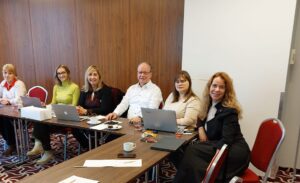 Jurmala 21 and 22 January project meeting in Latvia
Jurmala 21 and 22 January project meeting in Latvia
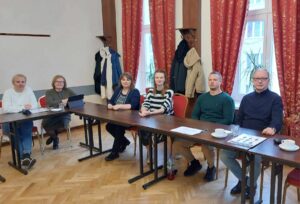 Ineda – Design meeting Warsaw, November 24 and 25, 2023
Ineda – Design meeting Warsaw, November 24 and 25, 2023
Development of social entrepreneurship – new opportunities and development paths. SocEnter project.
2021-1-PL01-KA220-ADU-000030093
Project duration: December 2021 – December 2023
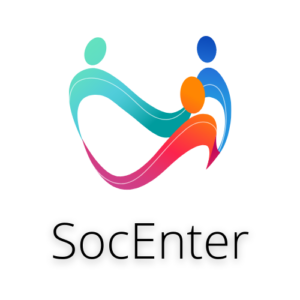
A big problem is the lack of adequate education in the field of social entrepreneurship. Through cooperation and international exchange of internships, we plan to expand our experience in this field. The basic needs are clear – educating tutors and employees of organizations participating in the project, sharing experiences and joint planning of activities in the field of economy and social entrepreneurship. During the project, we want to create a professional consortium that will prepare high-level training concepts for people who want to set up social economy entities and deal in practice with social entrepreneurship. We want to prepare a specific guide. We believe that the social economy is a good form of fighting against social exclusion.
We have noticed that often beginning social entrepreneurs are left alone with their ideas and have no one to help and advise them. The result of our project will be active help for adults in developing an active attitude as well as entrepreneurship and competences in the field of the social economy. By addressing these issues, we strive to support the use of new educational methods and modern technologies in the science and education of social entrepreneurship.
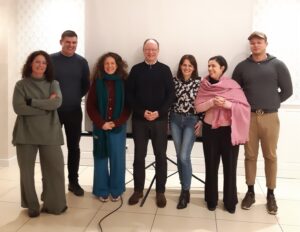 Project meeting – CUS Drobin 13 XII 2022 SocEnter
Project meeting – CUS Drobin 13 XII 2022 SocEnter
What do we want to achieve by implementing the project
Our main goal in this project is to share experiences, knowledge and acquire useful competences for the development of social entrepreneurship. One of the important goals that we plan to achieve is the creation of an extensive educational program on the creation of social economy entities for interested people and organizations. The complexity of this project requires us not only to become practitioners, but also to broaden our view on a whole range of topics related to social entrepreneurship. The project requires us to become experts in this field and in order to properly coordinate our future activities, we have to share good practices and exchange experiences and knowledge with all project partners.
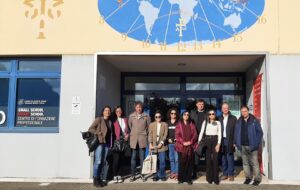 Project meeting Udine, Italy February 7-8, 2024
Project meeting Udine, Italy February 7-8, 2024
Family and personal portfolio management – pitfalls and threats
Project genesis
In no secondary school or vocational school, there are no classes in economics and practical dealing with financial matters, as is the case in most fields of study. The only exception are schools and economic faculties. What we mean here is, first of all, practical knowledge of economics, i.e. the everyday dimension. They do not teach us in schools and universities how to protect ourselves from financial frauds and how to deal with a complicated system of contracts and financial offers. Through our training, we want to fill these gaps and increase people’s awareness of managing their own budget.
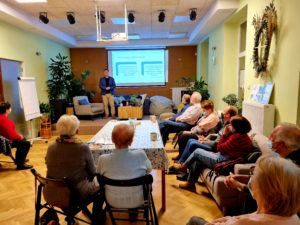
What do we want to achieve by implementing the project
The main goal of our project is to increase competences in personal finance management and in shaping a balanced and coherent home or personal budget. As part of our training, eight thematic modules have been developed, dealing with issues such as forms of doing business in Poland, getting out of the spiral of debt or workshops on understanding civil law contracts.
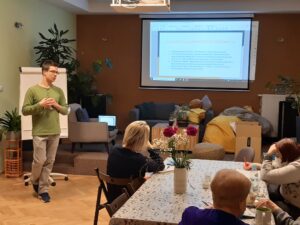
Classes are conducted in the Mazowieckie Voivodeship. Detailed information can be obtained by writing to the following address:
[email protected]
